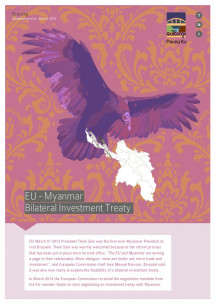On March 5th 2013 President Thein Sein was the first-ever Myanmar President to visit Brussels. Thein Sein was warmly welcomed because of the reform process that has been put in place since he took office. “The EU and Myanmar are turning a page in their relationship. More dialogue, more and better aid, more trade and investment’’, said European Commission chief Jose Manuel Barroso. Brussels said it was also now ready to explore the feasibility of a bilateral investment treaty.
In March 2014 the European Commission received the negotiation mandate from the EU member States to start negotiating an Investment treaty with Myanmar.
Conclusions and recommendations:
- BITs potentially undermine a countries’ long-term economic and social development. BITs provide rights to investors and obligations on host states.
- BITs offer investor protection and rights to foreign investors irrespective of whether the investors actually contribute in any meaningful or positive way to the host state’s development.
- BITs prioritise foreign investors over local investors. For a country such as Myanmar, it’s important to strengthen it’s local small and medium enterprises.
- BITs favour investor’s rights above those of communities and governments. Communities can’t go to the same international tribunals in case their human rights or environment are affected by investments.
- BITs limit policy space of governments to put in place policy in the public interest. They also have a chilling effect on policy.
- The reform process in Myanmar is still in its early stages. New laws and policies still need to be developed and existing laws improved in order for Myanmar to embark on a sustainable development trajectory. This would highly be limited by ISDS or make the exercise of democratic rights very costly.
- Myanmar could take advantage of the fact it enters the global economy and global investment frameworks at this stage. It still has a choice. It can learn from the experiences of other countries with BITs and take a well- considered decision.
- There are alternatives available to investors if they wish to protect their investment; such as private insurances. This way Myanmar would not give a blank cheque to all foreign investors.
- There is a need for the Burmese government, Members of Parliament, ethnic stakeholders, civil society and the business sector to do a cost and benefit analyses of ISDS in the future EU–Myanmar BIT.
Published by Paung Ku and the Transnational Institute
Pages: 8

